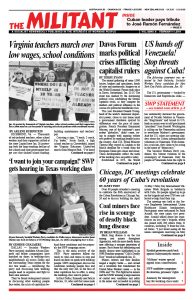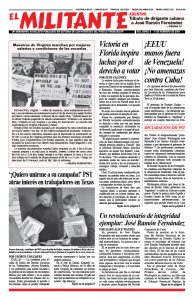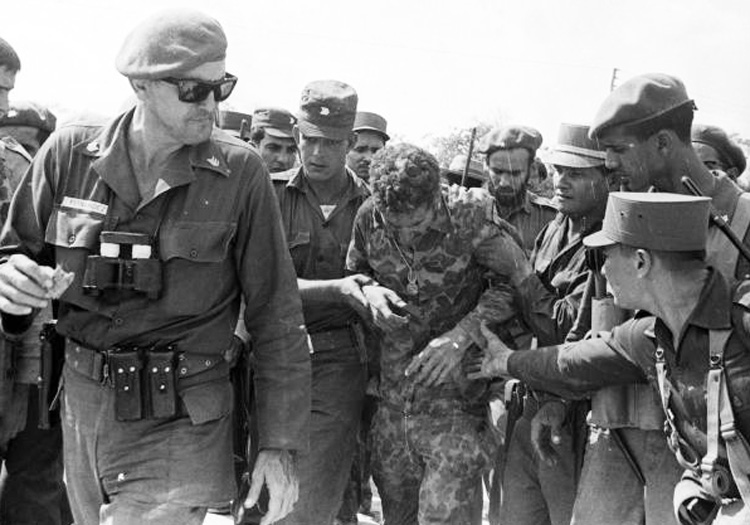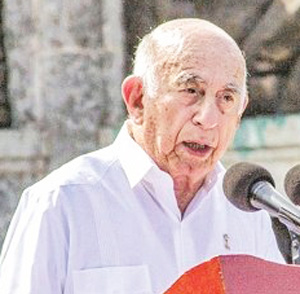Speech by José Ramón Machado Ventura, second secretary of the Communist Party of Cuba, at memorial tribute to José Ramón Fernández in Havana, Jan. 8. Family members present included Asela de los Santos, Fernández’s lifelong companion. The translation and breakers are by the Militant.
Dear Asela and other members of Division General José Ramón Fernández Álvarez’s family.
Compañero Miguel Díaz-Canel Bermúdez, president of the Councils of State and Ministers.
There are individuals who have led such full, genuinely exemplary lives that it is impossible to associate them with the idea of death. We will always remember them associated with life, with their productive work for the good of their people and of humanity.
Fernández is, without the slightest exaggeration, one of these exceptional beings. His sense of duty and his ethical principles were an infallible compass in everything he did.
As soon as Army General Raúl Castro Ruz, the first secretary of our party, heard the news of Fernández’s death, he was one of the first to convey condolences, from Santiago de Cuba, where he is now. I am sure that the vast majority of Cubans share these feelings of solidarity. Please receive them on behalf of us all.
During the early years of his adult life, still without a clear conception of what would be the right path, imagine how much moral strength it took to consistently maintain correct conduct in an environment in which there prevailed — with a few honorable exceptions — pettiness, selfishness, greed, and unprincipled rivalry to rise in the ranks.
That’s the way things were in the army of a republic under the Yankee boot — the army that idealistic young man entered, full of energy, with the sole aim of serving the homeland in any way he could.
Thanks to his tenacity, discipline, intelligence, effort, and accomplishments, Fernández overcame the many obstacles he faced, time and time again — obstacles that arose because of his steadfast refusal to capitulate to dishonorable proposals and his insistence of guiding himself solely by the dictates of his conscience. Through this difficult battle, he became convinced that it wasn’t enough to avoid getting involved, to simply repudiate the depth of corruption that existed. Action was needed, and without hesitation he risked everything. He initiated a conspiracy within the military, the only sector of society he knew, and the route he considered the most likely to succeed under the circumstances. Events showed him that his views were wrong.
In April of 1956 a Council of War, following the orders of the dictator, sentenced him to prison. He was sent to the so-called Model Prison on what was then known as the Isle of Pines.
This proved to be not only an undeserved punishment. It also turned out to be a veritable school that provided answers to many of his questions about how Cuba could gain true independence and provide a more just society for its children. Through daily interaction with the [July 26 Movement] combatants, he began to see the true and only path to making that long-held dream a reality.
Until then, Fernández had been one of the army’s exceptional honorable officers. But during those hard years in prison First Lieutenant Fernández became forever “El Gallego” Fernández — an unconditional soldier of the revolution.
Becoming a revolutionary
By Jan. 1, 1959, the incorruptible and upright patriot had also become a courageous and convinced revolutionary. He wasn’t yet a communist in the full sense of the word. But he was a man with advanced social and political views, one ready to risk everything to make those views a reality.
That’s what his compañeros in the political prison told the main leaders of the revolution. This explains why, shortly after the triumph, both the Commander in Chief and Commander Raúl Castro Ruz met with Fernández to discuss what help could be expected from him. That initial conversation was enough for both of them, separately, to reach the same conclusion. They had before them a sincere, transparent man who said what he thought and did so with absolute clarity. In short, he was someone in whom the revolution could have confidence.
He was immediately entrusted with important tasks. Fernández, the charismatic Gallego, a Santiago native with the accent of one born on Spanish soil, who shortly before had decided, with deep disappointment, to give up his military career, accepted Fidel’s request without second thought and turned down the sizable salary of a sugar mill administrator, a job he had already agreed to take. He put on the olive green uniform, accepted the modest pay of a Rebel Army officer, and headed out to fulfill the mission he was entrusted with.
As Fernández demonstrated his capabilities, the initial intuitions of the leader of the revolution and Commander Raúl Castro about him changed rapidly into a profound conviction.
Helping forge new revolutionary army
Fernández’s extensive contributions since then are well known to our people. In the convulsive first years of the revolution, he went from one mission to another as circumstances dictated. With characteristic modesty, he placed his military knowledge at the disposal of the newborn Revolutionary Armed Forces. This proved extremely valuable in confronting the relentless aggression by our powerful northern neighbor, which began immediately.
He was assigned to head the Rebel Army’s Cadet Academy. Without neglecting this responsibility, he also assumed command of preparing Havana’s first militia battalions — combatants who were awarded a “green beret” after completing brief but intense training. Alongside them, he took part in confrontations with counterrevolutionary bands organized and armed by the United States.
Fernández later served as founding director of the Militia Leadership School in Matanzas, and went with its students to fight at Playa Girón. There, under the direct command of the commander in chief, he played an outstanding part in leading the actions that produced the first big defeat of US imperialism on this continent.
Given such outstanding merits, he was awarded the rank of commander in June 1961. A month later he was appointed to head the Directorate of Combat Preparedness within the general staff of the Revolutionary Armed Forces.
In 1964 he graduated from the Superior School of War as a member of its first class, and in January 1969 he was appointed deputy minister of instruction in the Revolutionary Armed Forces. There he carried out valuable work in organizing and developing officer training within the educational institutions of the Revolutionary Armed Forces. More than a few of the principles he instituted remain in force today.
The year 1970 marked the beginning of another important chapter of his life. He was appointed minister of education and later vice president of the Council of Ministers for education and sports.
In carrying out these responsibilities, Fernández interpreted and put into practice ideas, conceived by the leader of the revolution, to advance the extraordinary educational work that has taken place in our homeland.
His contributions to the national educational system at all levels are notable and they are well known. The same is true in sports, where he headed the Cuban Olympic Committee for many years and continued as its honorary president until his death.
Thousands of teachers, professors, trainers, and athletes remember him with affection and respect. He was always in close contact with them and with the multitude of children, teenagers, and young students.
In 2012, when his health and advanced age required a slower pace of work, he continued contributing his experience and knowledge as an adviser to the president of the Councils of State and Ministers. Until very recently, overcoming his difficulties walking, we would see him arrive very early every morning at the Palace of the Revolution to fulfill this important responsibility.
Our people paid well-deserved acknowledgments to such effort and results. A founding member of the party, he was a member of its Central Committee from the First Congress in 1975 on, an alternate member of the Political Bureau, and an active party member and delegate to all party congresses. He was elected to the National Assembly of People’s Power at its formation in 1976 and remained a deputy at the time of his death.
He was awarded many honors, both national and international. Noteworthy were his recognition as a Hero of the Republic of Cuba and decoration with the Order of Playa Girón on April 16, 2001, the 40th anniversary of that momentous victory.
A book containing his memoirs, with a foreword by Army General Raúl Castro Ruz, came off the press some two months ago, with the idea of presenting it to the public on the occasion of his 95th birthday.
That didn’t happen. Already bedridden when he received the first copy and heard about the idea, he insisted — strongly — that the book presentation not take place on that date. “That would be rather pretentious on my part,” he said. That’s the way Fernández was.
At the end of the book, he wrote these lines that by themselves explain the meaning of his long and fruitful life as a revolutionary:
“My greatest pride, in the healthy sense of the word, is to have had the confidence of two great men of our revolutionary process, Commander in Chief Fidel Castro Ruz and Army General Raúl Castro Ruz.”
Fernández continued:
“My experiences were shaped by these two individuals, who I have followed throughout all these years, and by my commitment to my homeland and the people of Cuba, which I cherish with all my heart. They are the incentive to continue contributing my physical and mental energy to this great work of the Cuban socialist revolution. My only duty is to be faithful to that confidence as long as there is life in me.”
So end his words, to which could only be added: You did so until the last moment of your existence.
Thank you for the example you have left us! Every one of us who knew you, and our entire people, will remember and look up to you forever, dear compañero Fernández.
Thank you very much.



